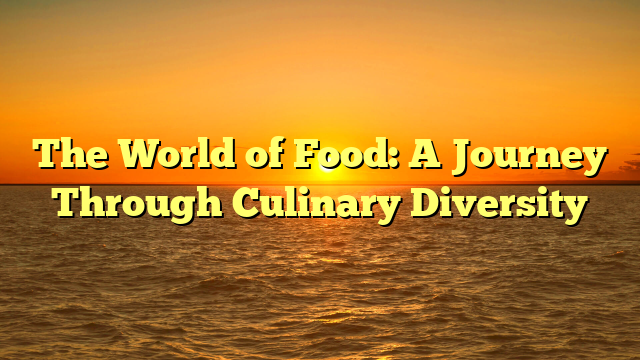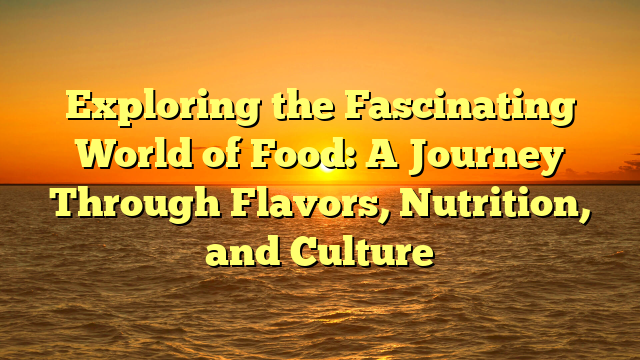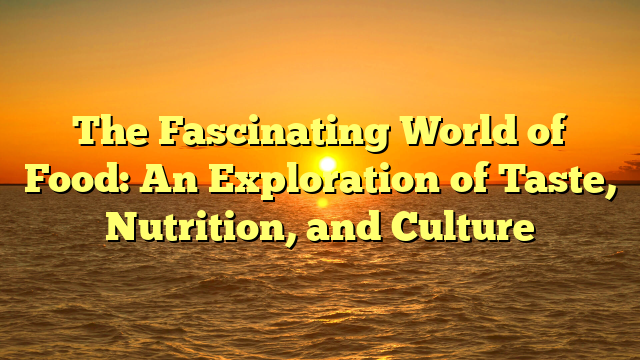
Food is more than just fuel for the body; it is an expression of culture, history, and creativity.
Every region of the world has developed unique culinary traditions, which have evolved over
centuries, shaped by the local environment, available ingredients, and historical influences.
From street food stalls in Asia to fine dining in Europe, food has a profound way of
connecting people, making it a universal language that transcends borders and
backgrounds.
The Role of Food in Culture
Food plays a vital role in shaping cultural identities. It is often the center of family gatherings,
celebrations, and festivals. For example, in Italy, food is not just a meal, but an experience
that brings families together. Whether it’s a simple pasta dish shared among loved ones or a
traditional Christmas feast, meals in Italy are about connecting with one another. Similarly, in
countries like Mexico, the concept of “comida” goes beyond eating; it’s about sharing food
with family and friends as an expression of love and hospitality.
In other parts of the world, food is deeply tied to religion and rituals. In India, for instance,
food offerings are a common part of religious ceremonies. The act of cooking and serving
food to the gods is seen as a spiritual practice. Likewise, in Jewish culture, food is central to
many of their religious holidays, such as the Passover Seder, which features symbolic foods
representing different aspects of the story of the Exodus.
Food and Its Health Impact
Food not only nourishes the body but also plays a crucial role in maintaining health. Eating a
balanced diet can prevent numerous diseases and contribute to overall well-being. Over the
past few decades, however, there has been growing concern about unhealthy eating habits,
particularly in Western societies, where fast food and processed foods have become staples
in many diets.
The importance of a balanced diet is emphasized by nutritionists, who advocate for the
consumption of fruits, vegetables, whole grains, and lean proteins. These foods provide
essential vitamins, minerals, and antioxidants that support immune function, promote healthy
digestion, and maintain skin and heart health. In contrast, diets high in sugar, salt, and
unhealthy fats can lead to chronic diseases such as diabetes, obesity, and cardiovascular
problems.
On the flip side, some foods have been lauded for their healing properties. Turmeric, a spice
commonly used in Indian cooking, is known for its anti-inflammatory benefits, while ginger
has been used for centuries to treat digestive issues. The Mediterranean diet, which is rich in
olive oil, fish, and vegetables, has been linked to a reduced risk of heart disease and stroke.
The modern interest in superfoods such as quinoa, chia seeds, and kale also reflects a
growing awareness of the power of food in promoting health.
The Globalization of Food
The rise of globalization has brought with it a fusion of culinary traditions from different parts
of the world. In major cities like New York, London, and Tokyo, it’s common to find
restaurants serving an eclectic mix of cuisines, from sushi burritos to taco pizzas. slot demo mahjong has made food more accessible and diverse, allowing people to
experience flavors from across the globe.
However, globalization has also led to concerns about the loss of traditional food cultures.
Many local dishes are being overshadowed by global fast food chains and processed
snacks. In some regions, traditional farming methods and local ingredients are being
replaced by industrial food production. This has raised questions about sustainability and the
preservation of food heritage.
Despite these challenges, many people are turning to local and organic foods, which support
sustainable farming practices and help preserve regional food traditions. The growing
popularity of farmers’ markets, organic restaurants, and community-supported agriculture
programs are testaments to the desire for more authentic, environmentally-friendly food
choices.
Street Food: A Global Phenomenon
One of the most exciting trends in global food culture is the rise of street food. Street food is
an affordable, accessible, and often delicious way to experience a culture’s culinary
offerings. In places like Bangkok, Mumbai, and Mexico City, street vendors serve everything
from skewered meats to flavorful dumplings, often with vibrant colors and aromas that draw
people in.
Street food often reflects the daily lives of local people, offering a glimpse into their eating
habits and preferences. In Vietnam, for example, pho – a noodle soup with meat and herbs –
is commonly eaten as a breakfast dish, while in South Korea, banchan (small side dishes)
are served alongside rice and kimchi, offering a balance of flavors and textures. The
informality and ease of street food also encourage social interaction, as people gather in
public spaces to enjoy their meals.
In recent years, the popularity of food trucks in cities across the United States has brought a
modern twist to this age-old tradition. Food trucks offer a mobile way to enjoy everything
from gourmet tacos to artisanal ice cream. This trend has allowed chefs and food
entrepreneurs to experiment with new ideas, offering creative menus that push the
boundaries of traditional street food.
The Future of Food
As the global population grows, the future of food will need to address several challenges.
One of the biggest concerns is how to feed an estimated 9.7 billion people by 2050.
Solutions such as sustainable farming, lab-grown meat, and plant-based diets are already
being explored as ways to meet this demand without depleting natural resources.
Technology is also playing a significant role in shaping the future of food. Innovations such
as vertical farming, where crops are grown in stacked layers, and genetic modification, which
allows for the development of more resilient crops, are changing the way we think about food
production. Moreover, the development of meat alternatives made from plant proteins is
helping to reduce the environmental impact of livestock farming.
While challenges remain, the future of food is exciting and full of possibilities. Whether
through sustainability, technology, or the continued fusion of global cuisines, the evolution of
food will undoubtedly continue to shape cultures, health, and our collective future.
Conclusion
Food is not just about sustenance; it is a reflection of the world we live in. It connects people
across cultures, offers a window into history, and plays a key role in maintaining health. As
food cultures evolve and adapt to modern challenges, it will remain a central part of the
human experience, a symbol of creativity, diversity, and unity.





